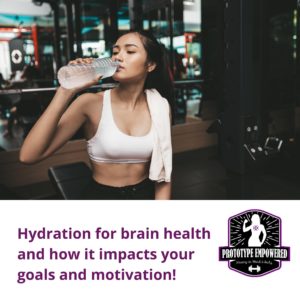By Leah Hantman

The dog days of Summer reminds us to drink more water. The hot weather, more time outside and all the sweating are constant reminders to drink up. As the Fall approaches many of us let the habit of drinking water fall by the wayside. Kids are back to school, work picks up and life gets busy. It’s around this time we start to see people’s fatigue levels increase and often stress coincides. One of the first things I have clients focus on is developing good hydration habits. For weight-loss? Not exactly…
Our bodies are 60% water and our brain and heart alone are 72% water. If you exercise often and aren’t drinking enough water you can expect to see decreased performance and recovery.
You’ll often see water recommended to help you recover from workouts and to increase energy. What we often don’t talk about in the fitness world is how hydration affects motivation, productivity, concentration and mood. All of these factors make or break outcomes and chances of long-term success.
We all know those days where we wake up exhausted, cranky and wanting to hit snooze. Those aren’t the days we are excited to workout or interested in pursuing our goals. If you are chronically dehydrated the chances increase for having lagging workouts. You may experience decreased energy. You may see your mood alter in negative ways. None of these experience motivate us not want to work towards our goals on a daily basis.
Let’s dive a little deeper. The long term consequences of chronic dehydration on cognitive function are staggering. Here are some of the things you need to know that might get you thinking about hydration a little bit differently!
Chronic Dehydration Issues
- Decreased blood flow to muscles and to the brain:
- Dehydration reduces cardiac output and blood flow to the muscles and brain. This already doesn’t sound so good does it?
-
- The brain uses about 20% of available oxygen which means that Cerebral blood flow is a crucial factor in overall wellness. Have you ever seen a marathon runner looking dazed and confused and unable to walk or run? This is an acute and extreme case of dehydration. If we take chronic daily dehydration we can see decreased function in similar areas but just to a far less extent. This directly impacts our workouts by decreasing our capacity to do work.
- Decreased concentration and focus:
- Without water, it can be difficult to focus throughout the day. This leads to greater effort and consequently greater fatigue. It can also affect our mood. Our brain cells rely heavily on water and how it reacts with other elements in the body. Without this reaction, brain cells lose efficiency.
- Memory
- Various studies have shown that mild to moderate levels of dehydration can impair short-term memory. This will have a direct impact on your productivity and quality of work. It can also affect your day to day interactions with others and make it harder to stick to a plan.
- Mood
- Even mild dehydration has an impact on our mood. Dehydration creates fatigue and decreased attention span which can make us irritable and anxious. If we have a preexisting mental health condition, dehydration can be triggering .
- Motor Skills
- We all know not to drink alcohol and drive. What about the concept of NOT DRINKING ENOUGH WATER and driving? Sounds silly? Think again! Studies show that those who are dehydrated commit a significantly greater number of errors in driving. Their performance during dehydration compared to performance while under the influence of alcohol. Increased lane drifting, delayed brake time and a general lack of awareness were all increased.
- Motivation
- There is a cluster of neurons in our brain that are critical for motivation. They are located in the middle of the brain in a region called the ventral tegmental area. THIS IS OUR REWARD SYSTEM!
- Moderate levels of dehydration affect our brain function in the mid-brain and frontal lobe. These areas are responsible for decision making and judgement. They also work with motivation, emotional expression and forward thinking.
- If we have decreased function in the areas it is more likely we succumb to instant gratification desires. We will more than likely want to sit and rest on the couch or skip a workout instead of sticking to our routine and goals.
The link between your brain and your goals is so important! We put so much time into planning our workouts but we miss the brain health piece of the puzzle. It doesn’t matter what workout program or goals we have planned if we aren’t motivated enough to stick with it.
